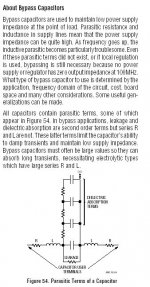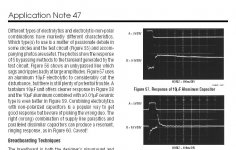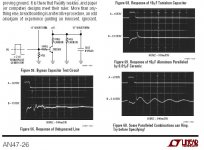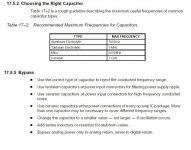I asked these questions on another thread but did not get satsifactory answers, could somebody please explain?
Yes, I don't know much about electronics , yet.
Thanx for any answers and explanations.
=============================================
"Re: A new Aleph3 is born... "
quote:
--------------------------------------------------------------------------------
Originally posted by Smithers
......, 6x47000uF Caps bypased with Wima MKP10 1uF, Mcap Supreme (induciotnfree) 0.1uF and a 10nF .....
--------------------------------------------------------------------------------
=============================================
Questions:
1. Does all this bypassing really help and what does it actually do ?
2. Why 3 differant values?
3. What type of caps works best for this purpose?
Yes, I don't know much about electronics , yet.
Thanx for any answers and explanations.
=============================================
"Re: A new Aleph3 is born... "
quote:
--------------------------------------------------------------------------------
Originally posted by Smithers
......, 6x47000uF Caps bypased with Wima MKP10 1uF, Mcap Supreme (induciotnfree) 0.1uF and a 10nF .....
--------------------------------------------------------------------------------
=============================================
Questions:
1. Does all this bypassing really help and what does it actually do ?
2. Why 3 differant values?
3. What type of caps works best for this purpose?
Bypass
They use bypass capacitors because the electrolytics don't work too well with high frequencies.
That means the resistance of the electrolytics rises at higher frequencies.
So what they do is to bypass them with smaller caps of a better quality. Usually with polymer film types but you can use ceramic caps too.
They use different values because the smaller a cap is, the better it performs in the higher frequency range.
This way they combine high capacity with good high frequency performance.
They use bypass capacitors because the electrolytics don't work too well with high frequencies.
That means the resistance of the electrolytics rises at higher frequencies.
So what they do is to bypass them with smaller caps of a better quality. Usually with polymer film types but you can use ceramic caps too.
They use different values because the smaller a cap is, the better it performs in the higher frequency range.
This way they combine high capacity with good high frequency performance.
C Cascades
Even the best "elkos" are not really fast and capable to supress HF-distortions. I guess that is the reason why bypass caps do so much of positive audio effects.
The values and optimal kinds of Caps can just be found by listening test. I did it this way: first checked the basis of any cascade, an additional MKP (from Wima or simular good stuff). To big ones slowed down the music and made it "fat", I found just 1UF appropriate. Next step of the cascade: an extremely fast = inductance free Cap. The 0,1UF M-Cap Supreme from Mundorf is the best I know. More transparency, more details. But that is not all - extremely fast small KP Caps (like EMZ Serie B 33531, ERO KP 1830 etc.) really whipe away last dirt from the window we have to look through listening to the musik. Sorry for having mentioned just Europien product - but I have to buy here...
If I unconnect this cascade the sound really suffers a lot. The difference is that big that everybody here could immedeatly recognize without any double blind test ore other tests. I compared my Aleph 4 monos to other DIY Aleph 2 and original production Aleph 2. The cascaded Alephs really have blown away the others! Much mor definition, focus, transparency...
I think original products can just not afford this extra parts, their prices are quite high. For DIY no problem...
Test it and enjoy! But a warning: with not fitting bypass Caps the sound can be disturbed very easily - long listening tests are a must - and one step after the other. Become shure of what each cap is doing.
Of cause this cascades do the same in cross over loudspeaker networks.
Even the best "elkos" are not really fast and capable to supress HF-distortions. I guess that is the reason why bypass caps do so much of positive audio effects.
The values and optimal kinds of Caps can just be found by listening test. I did it this way: first checked the basis of any cascade, an additional MKP (from Wima or simular good stuff). To big ones slowed down the music and made it "fat", I found just 1UF appropriate. Next step of the cascade: an extremely fast = inductance free Cap. The 0,1UF M-Cap Supreme from Mundorf is the best I know. More transparency, more details. But that is not all - extremely fast small KP Caps (like EMZ Serie B 33531, ERO KP 1830 etc.) really whipe away last dirt from the window we have to look through listening to the musik. Sorry for having mentioned just Europien product - but I have to buy here...
If I unconnect this cascade the sound really suffers a lot. The difference is that big that everybody here could immedeatly recognize without any double blind test ore other tests. I compared my Aleph 4 monos to other DIY Aleph 2 and original production Aleph 2. The cascaded Alephs really have blown away the others! Much mor definition, focus, transparency...
I think original products can just not afford this extra parts, their prices are quite high. For DIY no problem...
Test it and enjoy! But a warning: with not fitting bypass Caps the sound can be disturbed very easily - long listening tests are a must - and one step after the other. Become shure of what each cap is doing.
Of cause this cascades do the same in cross over loudspeaker networks.
diode bypasses
Caps bypassed to rectifiers/diodes are used to smooth the cut off reverse current peak which causes HF distortions. They must be exactly fitting to be effective "cleaning".
Some times good soft recovery and ultra fast diodes sound better w/o any cap. Schottkys also. It can easily be checked in listening tests.
Caps bypassed to rectifiers/diodes are used to smooth the cut off reverse current peak which causes HF distortions. They must be exactly fitting to be effective "cleaning".
Some times good soft recovery and ultra fast diodes sound better w/o any cap. Schottkys also. It can easily be checked in listening tests.
When we design an amp we assume a "battery" as power source and we also assume that the voltage has low impedance at all frequencies (beyond the amp's upper limit). Why? Because amplifier theories assume low impedance power supply voltage. If we have too high imdedance we get unpredictable reasults, may colouring the sound.
Let me also point out that the method of bypassing can be a science alone. Linear had a document about that when they have measured a couple of circiuts.
http://www.linear.com/pub/document.html?pub_type=app&document=50
This application note describes the technical aspects, not the audiophilic, but it is very educational with lot's of pictures and practical circuits (this I like).
I couldn't find the document I was looking for. Linear had an another document where they had tested tantal, polyester, electrolytics etc. Anybody who knows what I'm talking about?
Let me also point out that the method of bypassing can be a science alone. Linear had a document about that when they have measured a couple of circiuts.
http://www.linear.com/pub/document.html?pub_type=app&document=50
This application note describes the technical aspects, not the audiophilic, but it is very educational with lot's of pictures and practical circuits (this I like).
I couldn't find the document I was looking for. Linear had an another document where they had tested tantal, polyester, electrolytics etc. Anybody who knows what I'm talking about?
Real USEFUll stuff.
Now this is real good stuff, thanx alot. Everybody should check it out!!
peranders said:Let me also point out that the method of bypassing can be a science alone. Linear had a document about that when they have measured a couple of circiuts.
http://www.linear.com/pub/document.html?pub_type=app&document=50
This application note describes the technical aspects, not the audiophilic, but it is very educational with lot's of pictures and practical circuits (this I like).
Now this is real good stuff, thanx alot. Everybody should check it out!!
Can anyone tell me the difference between MKP and MKS caps, from WIMA? I want to order some for my DIY cd player, and see how it works out. I have zero experience in audiophile caps, well I know Black gates, and Jensen... But in the HF That just won`t cut it.
Tnx in advance
Tnx in advance
wazzup said:Can anyone tell me the difference between MKP and MKS caps, from WIMA? I want to order some for my DIY cd player, and see how it works out. I have zero experience in audiophile caps, well I know Black gates, and Jensen... But in the HF That just won`t cut it.
Tnx in advance
MKP = Polypropylen film
MKS = Polyester film
Uli
wazzup said:Can anyone tell me the difference between MKP and MKS caps, from WIMA? I want to order some for my DIY cd player, and see how it works out. I have zero experience in audiophile caps, well I know Black gates, and Jensen... But in the HF That just won`t cut it.
Tnx in advance
HI,
don´t ask me why - I mean a technical explanation. But IMHO MKP sound much better, MKS made at my tests all the time a "plastic-like sound". Maybe MKP behaves more neutral at current impulses.
Benchmark: most good Caps wourldwide use MKP (Audyn, Mundorf, Solen, ...) Hopefully they know, why.
Test both or buy MKP straight on.
regards
Klaus
Klaus said:
Benchmark: most good Caps wourldwide use MKP (Audyn, Mundorf, Solen, ...) Hopefully they know, why.
Test both or buy MKP straight on.
regards
Klaus
It depends on what you want to achieve by using such caps.
The difference is in the dielectric film.
Best tan phi (loss angle) and HF behaviour has Polystyrol (Philips "Styroflex") but reasonable capacitances are difficult
to make, expensive and bulky.
This "audiophile" MKP hype is to at least 80% marketing
strategy'! Using industry grade MKPs is enough, far cheaper
and for solid state usage more than enough!
Those Jensens "Paper in oil" are only good for VERY high voltage use!
Mundorf doesn´t manufacture, they buy assorted caps with their
label on it!
Never forget:
Best cap is no cap (at least in the signal path!)
Uli
dielectric behaviour
polyester and polypropylen have a different behaviour concerning
polarity of the voltage applied. Polyester has a higher loss angle
thus leading to a greater difference in reaction to polarity which
leads to higher THD.
You can improve sound quality drastically by applying a certain
dc voltage (higher than the highest ac peak to ensure that
polatity doesnt change) to the cap, as some exotic speaker
mfgs do.
Some of the so called "audiophile" caps are signed for input output. The inputside should have positive voltage compared to
output.
Uli
polyester and polypropylen have a different behaviour concerning
polarity of the voltage applied. Polyester has a higher loss angle
thus leading to a greater difference in reaction to polarity which
leads to higher THD.
You can improve sound quality drastically by applying a certain
dc voltage (higher than the highest ac peak to ensure that
polatity doesnt change) to the cap, as some exotic speaker
mfgs do.
Some of the so called "audiophile" caps are signed for input output. The inputside should have positive voltage compared to
output.
Uli
JDeV said:1. Does all this bypassing really help and what does it actually do ?
2. Why 3 differant values?
3. What type of caps works best for this purpose?
I regard this as a religious argument thing. I think religions are good and useful, and arguments between religious beliefs are interesting, and like the Jerry Springer show, even entertaining, but the fact is that solid information is hard to come by.
The good news is that you can build up your average circuit without film bypassing and it will work fine. Then you can go about the process of trying different sorts of bypassing and see where it gets you. This is the DIY part, and while it is helpful to listen to opinions, they should just serve as a starting point for your own exploration.
I don't usually provide bypassing information in my projects, except perhaps as a passing thing, because I expect that those who are the least concerned about these issues will find their own solutions and don't need my help.
On the contrary, my opinion would be a hindrance....
pass/ - not out to hinder DIY, and still enjoying halo style sign-off
Re: Re: Purpose of Bypass caps
Chapter 13 from "The Religion to ByPass" by Pass .

Nelson Pass said:
I regard this as a religious argument thing. I think religions are good and useful, and arguments between religious beliefs are interesting, and like the Jerry Springer show, even entertaining, but the fact is that solid information is hard to come by.
Chapter 13 from "The Religion to ByPass" by Pass .

peranders said:Let me also point out that the method of bypassing can be a science alone. Linear had a document about that when they have measured a couple of circiuts.
http://www.linear.com/pub/document.html?pub_type=app&document=50
This application note describes the technical aspects, not the audiophilic, but it is very educational with lot's of pictures and practical circuits (this I like).
Abstract from this document:
Attachments
- Status
- This old topic is closed. If you want to reopen this topic, contact a moderator using the "Report Post" button.
- Home
- Amplifiers
- Pass Labs
- Purpose of Bypass caps



